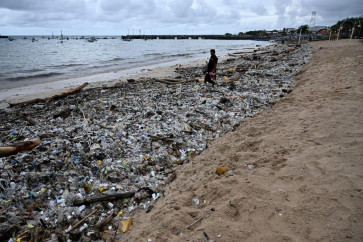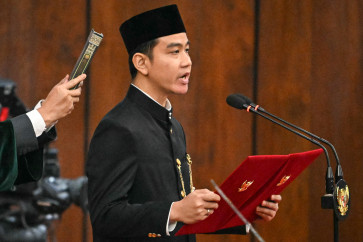Batam policy leaves industry in doubt
The government’s decision to merge the leadership of the Batam Industrial Development Authority (BP Batam) with the Batam city administration has created confusion among businesspeople, who argue that it is not a solution for the problem of overlapping authorities in the island city
Change text size
Gift Premium Articles
to Anyone

T
he government’s decision to merge the leadership of the Batam Industrial Development Authority (BP Batam) with the Batam city administration has created confusion among businesspeople, who argue that it is not a solution for the problem of overlapping authorities in the island city.
Makruf Maulana, chairman of the Riau Island chapter of the Indonesian Chamber of Commerce and Industry (Kadin), said the merger had sparked concerns among businesses that the future development of Batam as a free trade zone (FTZ) and a free port area would become unclear.
“Regulations made by the central government for Batam have often changed; the regulations always changed whenever there was a change of president,” he said on Friday, stressing that it would create legal uncertainty.
“The government will appoint the mayor of Batam as BP Batam ex-officio head; will he be able [to do his tasks]? Is there any guarantee that investment in Batam will run smoothly?” he asked.
While saying he welcomed the central government’s move, Batam Mayor Muhammad Rudi on Thursday declined to comment on the details, explaining that he had no prior knowledge of the decision.
On Friday, Coordinating Economic Minister Darmin Nasution told reporters that the decision was taken to debottleneck business licensing in Batam.
“[Some business licenses] were under the mayor of Batam’s authority, while others were under the authority of BP Batam,” said Darmin. “[The merger] was done so that there is no dualism of leadership.”
However, Makruf argued that if the central government was serious in addressing the problem of “dual authority” in Batam, it should have issued a government regulation (PP) that stipulated the relationship between BP Batam and the Batam city administration, which was mandated by Law No. 53/1999 on the establishment of Batam City.
“The fact is, the government has never created the mandated PP, but now it comes up with a frontal decision [of a leadership merger],” he said.
BP Batam, previously called the Batam Authority, which was established in 1978, manages the FTZ and free port area of Batam under PP No. 46/2007. The regulation only grants Batam the status as a FTZ and free port area for 70 years after the regulation took effect in August 2007. It also authorizes BP Batam to issue business licenses, including permanent licenses and land allocation permits.
Darmin said the government considered that the appointment of the mayor of Batam as BP Batam ex-officio head would provide greater authority to the local administration in developing its economy, based on the spirit of regional autonomy.
He added that a regulation had been prepared to serve as a legal basis for the decision and that it could be issued early next year.
Current BP Batam head Lukita Dinarsyah Tuwo declined to comment on the merger. Lukita was previously a secretary to the coordinating economic minister. Alongside his five deputies, he was appointed to lead BP Batam in November 2017, replacing Hatanto Reksodiputro.
Not all business players in Batam rejected the merger. Mook Sooi Wah, general manager of the Batamindo Industrial Park, said the central government had taken the right step to accelerate Batam’s development as businesses previously even had to deal with a third authority, the Riau Islands provincial administration.
He said BP Batam, the Batam city administration and the Riau Islands provincial administration should have been working harmoniously to accelerate development in the area, but each of them had often acted as the sole “captain” with different policies.
“We need guidance from the central government to give direction to the three parties to develop Batam,” he said.
Mayor Rudi, meanwhile, already had some proposals for the future management of Batam, such as changing its FTZ and free port area status into a special economic zone. He said he had also long considered scrapping the mandatory annual fees paid by homeowners in Batam to BP Batam. He said such fees should not target residential areas and they were not a problem for investors.









